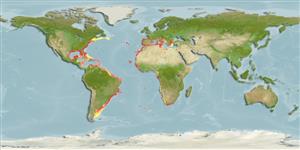>
Scombriformes (Mackerels) >
Scombridae (Mackerels, tunas, bonitos) > Scombrinae
Etymology: Scomber: Greek, skombros = tunny or mackerel, 1623 (Ref. 45335).
More on author: Gmelin.
Environment: milieu / climate zone / depth range / distribution range
Ecologia
marino; salmastro. Temperate; 46°N - 65°S, 98°W - 42°E
Atlantic Ocean. Warm water; eastern and western coasts, including the Mediterranean and southern Black Sea. Replaced by Scomber japonicus in the Indo-Pacific.
Length at first maturity / Size / Peso / Age
Maturity: Lm 21.3 range ? - ? cm
Max length : 55.0 cm TL maschio/sesso non determinato; (Ref. 121850)
Adults and juveniles feed mainly on zooplankton, with relative importance of larger organisms such as cephalopods, crustaceans and small pelagic fish increases with the size of individuals. Caught mostly in purse seine and pelagic trawl fisheries which target sardine and/or anchovy. Usually a by-catch but when availability of target species is low, this species provided an alternative income (Ref. 121850)
Collette, B.B., 1999. Mackerels, molecules, and morphology. p. 149-164. In B. Séret and J.-Y. Sire (eds.) Proc. 5th Indo-Pac. Fish Conf., Noumea, Paris. (Ref. 33246)
IUCN Red List Status (Ref. 130435: Version 2024-1)
Threat to humans
Harmless
Human uses
Pesca: scarso interesse commerciale
Strumenti
Special reports
Download XML
Fonti Internet
Estimates based on models
Preferred temperature (Ref.
123201): 13.9 - 27.3, mean 22.5 °C (based on 492 cells).
Phylogenetic diversity index (Ref.
82804): PD
50 = 0.5625 [Uniqueness, from 0.5 = low to 2.0 = high].
Bayesian length-weight: a=0.00741 (0.00474 - 0.01159), b=3.04 (2.91 - 3.17), in cm total length, based on LWR estimates for this species & (Sub)family-body (Ref.
93245).
Trophic level (Ref.
69278): 3.9 ±0.63 se; based on food items.
Generation time: 4.5 (3.2 - 5.5) years. Estimated as median ln(3)/K based on 16
growth studies.
Resilienza (Ref.
120179): Medio, tempo minimo di raddoppiamento della popolazione 1.4 - 4.4 anni (Preliminary K or Fecundity.).
Prior r = 0.60, 95% CL = 0.39 - 0.90, Based on 6 data-limited stock assessments.
Fishing Vulnerability (Ref.
59153): Moderate vulnerability (42 of 100).
Nutrients (Ref.
124155): Calcium = 21.2 [8.1, 51.9] mg/100g; Iron = 0.69 [0.26, 1.60] mg/100g; Protein = 20.7 [19.5, 21.9] %; Omega3 = 0.739 [0.500, 1.145] g/100g; Selenium = 42.7 [22.3, 80.3] μg/100g; VitaminA = 20.1 [6.0, 80.7] μg/100g; Zinc = 0.688 [0.442, 1.014] mg/100g (wet weight); based on
nutrient studies.
